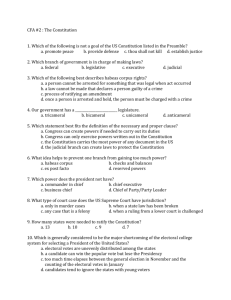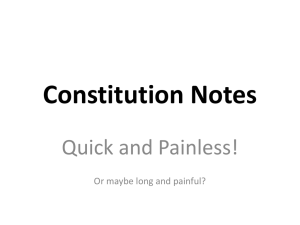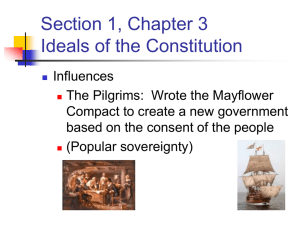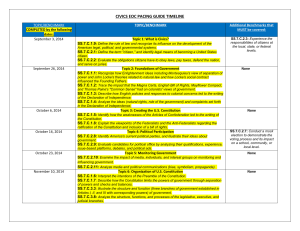American Government Chapter 4 “The United States Constitution
advertisement
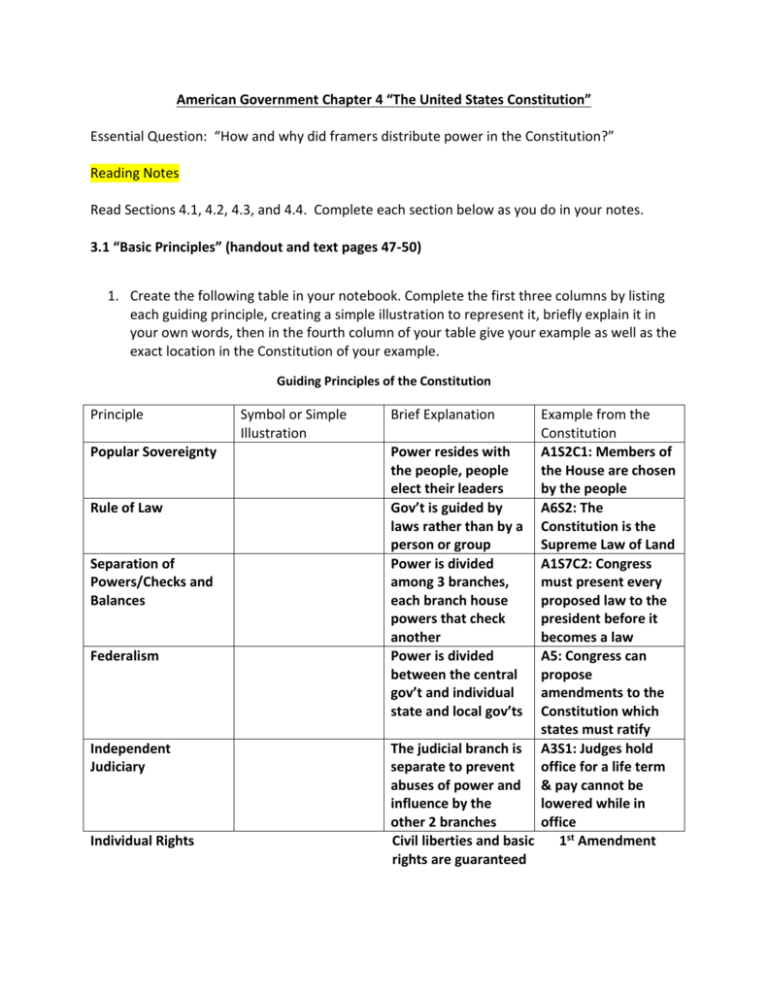
American Government Chapter 4 “The United States Constitution” Essential Question: “How and why did framers distribute power in the Constitution?” Reading Notes Read Sections 4.1, 4.2, 4.3, and 4.4. Complete each section below as you do in your notes. 3.1 “Basic Principles” (handout and text pages 47-50) 1. Create the following table in your notebook. Complete the first three columns by listing each guiding principle, creating a simple illustration to represent it, briefly explain it in your own words, then in the fourth column of your table give your example as well as the exact location in the Constitution of your example. Guiding Principles of the Constitution Principle Popular Sovereignty Rule of Law Separation of Powers/Checks and Balances Federalism Independent Judiciary Individual Rights Symbol or Simple Illustration Brief Explanation Example from the Constitution Power resides with A1S2C1: Members of the people, people the House are chosen elect their leaders by the people Gov’t is guided by A6S2: The laws rather than by a Constitution is the person or group Supreme Law of Land Power is divided A1S7C2: Congress among 3 branches, must present every each branch house proposed law to the powers that check president before it another becomes a law Power is divided A5: Congress can between the central propose gov’t and individual amendments to the state and local gov’ts Constitution which states must ratify The judicial branch is A3S1: Judges hold separate to prevent office for a life term abuses of power and & pay cannot be influence by the lowered while in other 2 branches office Civil liberties and basic 1st Amendment rights are guaranteed 2. Create a copy the chart below in your notebook. Use it to evaluate how the federal government serves the purposes set forth in the preamble of the constitution. Purpose Establish Justice Insure Domestic Tranquility Provide for the Common Defense Promote the General Welfare Example Constitution, Laws National Laws, Trade Laws Army, Navy, Air Force, Marines Social Security, Welfare, Health Care 3. Explain why each branch of government has a different set of responsibilities and powers. List at least two powers of each branch. So no single branch of government can become too powerful o Legislative Branch: make laws, approve treaties o Executive Branch: enforce laws, negotiate treaties o Judicial Branch: interprets laws, judges laws and executive actions constitutional 4. Complete Daily Quiz 3.1 worksheet 3.2 “Amending the Constitution” (text pages 51-55) 1. Create a simple flowchart the illustrates in detail the methods by which an amendment can be proposed and the ways they can be ratified. Proposed by 2/3 vote in both houses of congress OR National Convention called for by 2/3 of the states Ratified by 3/4 of state legislatures or special conventions from 3/4 of the states 2. Explain the purpose of the Bill of Rights. It protects individual liberties and acknowledges the powers of the states and the people 3. Copy the chart below in your notebook and use it to identify the rights guaranteed by the Bill of Rights. Rights Guaranteed by the Bill of Rights 1. 2. 3. 4. 5. 6. 7. 8. 9. 10. 4. Complete Daily Quiz 3.2 worksheet 3.3 “A Flexible Document” (text pages 56-59) 1. Copy the chart and use it to list examples of how the branches of government have interpreted their constitutional powers. Executive a Interpreting Constitutional Powers Judicial Legislative 2. Explain the importance of Marbury v. Madison Gave themselves the power to determine if a law is constitutional or not: judicial review 3. Explain how customs and traditions affected how government functions. How does the Constitutions wording allow the three branches of government to adapt to new circumstances? Shape how government is run and bring pressure to make formal changes. The Constitution is vague in its wording at places and not specific about how powers are to be carried out 4. Complete Daily Quiz 3.3 3.4 Constitution and the Public Good (text pages 60-62) 1. How can leaders use the system of checks and balances to try to avoid taking action? Some responsibilities are shared so they can blame each other 2. Complete Daily Quiz 3.4



